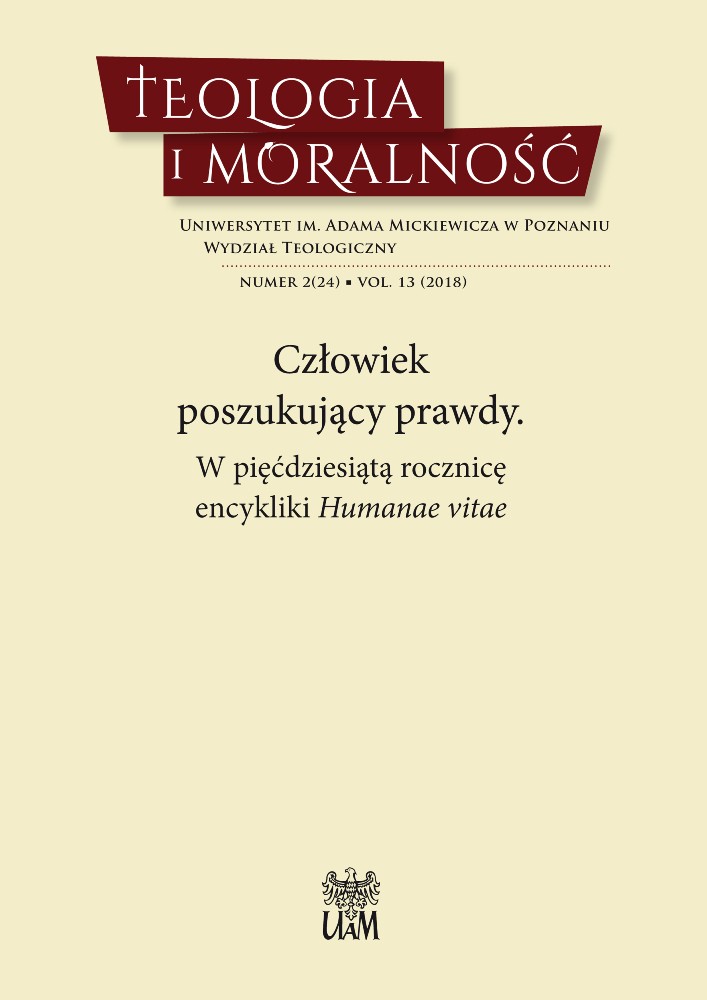Abstract
Truth occupies an important place in human life, and man himself is called to discover its fullness. Questions about the truth and its nature already appeared in antiquity and were on minds of the most eminent philosophers and later they wandered with the whole consequence through the ages towards modernity. The question of truth is also present in the teaching of the Catholic Church.
The current debate in reference to the concept of truth in its objective meaning can be formulated differently. In a diverse and multifaceted structure, a person needs to encounter his identity and pass through conceptual degradation in order to find clear signs which will show him the right direction of acting and make him able to accept reality in its deepest dimension. In this sense, truth appears as a condition sine qua non for the people who want to live their lives according to the requirements of the Gospel.
The following article attempts to approximate the reality of truth in its moral perspective based on the life and works of an outstanding theologian, John Henry Newman. He is a character who should be seen as one of the greatest thinkers of the 19th century, an exceptional writer and a great scholar. The life of this great man was filled with the love of truth, which many researchers understand in the category of passion, emphasizing a special kind of disposition directed towards the truth. Whoever reaches for his academic works and looks at his intellectual output recognizes him as an ardent disciple of truth who loved truth above all else. The fascinating history of the faith and courage of the English convert has become a determinant of all decisions he makes, and he himself is still an inspiration for everybody who wants to form their lives based on the foundation of the Truth.
References
Andrzejuk A. (2000), Prawda o dobru. Problem filozoficznych podstaw etyki tomistycznej, Warszawa.
Benedykt XVI (2009), Encyklika o integralnym rozwoju ludzkim w miłości i prawdzie Caritas in veritate, Rzym.
Benedykt XVI (2010), Aktualność Newmana w obliczu kryzysu wiary, „Acta Apostolicae Sedis” 102, s. 642-645.
Benedykt XVI (2011), Musimy trwać w wierze i czynić dobro, „Acta Apostolicae Sedis” 103, s. 33-41.
Ćmiel H. (2008), Teologia moralna szczegółowa, Częstochowa.
Demmer K. (1989), Interpretare e agire. Fondamenti della morale cristiana, Cinisello Balsamo.
Demmer K. (1991), Statuto epistemologico della verità morale, w: La norma nella vita morale del cristiano, red. S. Ronca, Milan, 11-22.
Demmer K. (1996), Wprowadzenie do teologii moralnej, tłum. A. Baron, Kraków.
Dulles A. (1990), From Images to Truth: Newman on Revelation and Faith, „Theological Studies” 51, s. 252-257.
Farrugia E.G., O’Collins G. (2002), Leksykon pojęć teologicznych i kościelnych z indeksem angielsko-polskim, tłum. J. Ożóg, Kraków.
Geissler H. (2004), Exemplary Commitment to the Service of Truth, „L’Osservatore Romano” Tygodniowa edycja w języku angielskim 11/18, s. 3.
Graneris G. (1962), Truth, w: Dictionary of Moral Theology, red. H.J Yannone, Westminster – Maryland, s. 1247-1248.
Jan Paweł II (1982), Przemówienie Kultura i perspektywy przyszłości świata, „L’Osservatore Romano” 3 nr 5, s. 15.
Jan Paweł II (1996), Encyklika o niektórych podstawowych problemach nauczania moralnego Kościoła „Veritatis splendor”, w: Encykliki Ojca Świętego Jana Pawła II, t. 2, Kraków, s. 531-637.
Jan Paweł II (2003), „Fides et ratio”. Tekst i komentarze, red. T. Styczeń, W. Chudy, Lublin.
Jaspers K. (1995), Philosophy of Existence, tłum. R.F. Grabau, wyd. 7, Philadelphia.
Jaspers K. (2003), Way to Wisdom. An Introduction to Philosophy, tłum. R. Manheim, Yale.
Judycki S. (2001), O klasycznym pojęciu prawdy, „Roczniki Filozoficzne” 49, s. 25-62.
Kaczyński E. (2007), Prawda – Dobro – Sumienie. Z zagadnień teologii moralnej, Warszawa.
Katechizm Kościoła katolickiego (2009), wyd. 2, Poznań.
Moskal P. (1994), Bóg a moralność. Nad encykliką „Veritatis splendor”, w: U źródeł tożsamości kultury europejskiej, red. T. Rakowski, Lublin, s. 136-138.
Newman J.H. (1901), Certain Difficulties Felt by Anglicans in Catholic Teaching, t. 1, London–New York–Bombay.
Newman J.H. (1973a), Nadzieja w Bogu Stwórcy, w: J.H. Newman, Rozmyślania i modlitwy, tłum. Z. Kubiak, Warszawa, s. 13-14.
Newman J.H. (1973b), Prowadź mnie, Światło, w: J.H Newman, Rozmyślania i modlitwy, tłum. Z. Kubiak, Warszawa, s. 5.
Newman J.H. (1979), To Jemima Newman (Oriel, March 13, 1829), w: The Letters and Diaries of John Henry Newman, t. 2, red. I. Ker, T. Gornall, Oxford, s. 129-131.
Newman J.H. (2000), Kazania uniwersyteckie, tłum. P. Kostyło, Kraków.
Newman J.H. (2009), Apologia pro vita sua, tłum. S. Gąsiorowski, Warszawa.
Norris T.J. (2014), Kardynał Newman dzisiaj, tłum. B. Moderska, Poznań.
Sancti Thomae de Aquino (1970), Quaestiones disputatae de veritate, q. 1 a. 1 co., w: Opera omnia, t. 22, red. Fratrum Praedicatorum, Rzym.
Skrzypczak R., Wznieśmy toast: za sumienie i za papieża!, „Fronda” 56 (2010), s. 106-113.
Tomasz z Akwinu (1999), Dysputy problemowe. O prawdzie, tłum. A. Białek, Lublin.
Vélez J.R. (2012), Passion for Truth. The Life of John Henry Newman, Charlotte – North Carolina.
Wanat Z. (2017), Obrona życia ludzkiego jako kwestia prawego sumienia, „Teologia i Moralność” 22, s. 53-68.
License

This work is licensed under a Creative Commons Attribution-NoDerivatives 4.0 International License.

